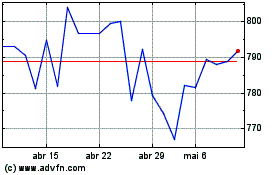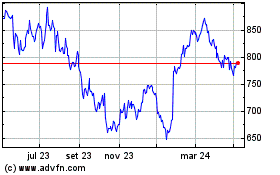Local Shoppers Are Luxury Brands' Hedge Against Covid-19 -- Heard on the Street
18 Novembro 2020 - 9:58AM
Dow Jones News
By Carol Ryan
With few tourists in cities such as Paris and New York this
year, luxury brands have had to lean on local shoppers. Their
appetite for expensive handbags and watches has been surprisingly
strong -- a comfort for investors as Covid-19 cases in the West
continue to climb.
Spending on luxury goods by Chinese consumers in 2020 will be
roughly one-third lower than last year, according to estimates
released Wednesday by consulting firm Bain & Company. American
and European shoppers are proving more resilient, spending a
projected 15% less. Partly thanks to these more mature markets,
Bain now forecasts that global luxury sales will be down 22% this
year, compared with an earlier worst-case estimate of a 35%
fall.
Robust demand from Western consumers has been an unexpected
boost for designer brands, which for years have been focused on the
Chinese. Last month, Gucci's owner Kering said sales in North
America increased by 44% in its third quarter, compared with the
same period the year before. French competitor LVMH Moët Hennessy
Louis Vuitton also said sales to Europeans and Americans were
up.
This flipping of the normal trend could prove fleeting. Cash
that consumers on both sides of the Atlantic would otherwise spend
in restaurants or on travel wound up in the tills of luxury brands
during lockdowns. Labels will face more normal competition for
spending once a vaccine is rolled out next year.
Conversely, Chinese sales will likely bounce back as global
travel resumes. They lagged behind for reasons of timing and
logistics rather than economic weakness: Asia was hit by the virus
during the first quarter, so consumers couldn't get out to shop for
China's Lunar New Year. Some price-conscious Chinese are waiting
until they can travel again to make luxury purchases, which are
cheaper in Europe. And many brands didn't have enough stores in
mainland China to recoup sales lost elsewhere. Before the pandemic,
the Chinese made 70% of their luxury purchases overseas.
There are signs that heavy investment in digital advertising
attracted new and younger buyers in all markets. Around 50% of the
luxury goods bought this year have been entry-level products,
according to Bain. That is a promising sign, but the spending power
of these groups also could dwindle as job losses creep up in Europe
and the U.S. Youth unemployment in the eurozone was 17.6% in
September, up from 15.9% in the same month of 2019, Eurostat data
show.
The relative resilience of luxury goods sales this year helps to
explain the sector's high stock prices. Shares in LVMH, which owns
a big duty free and hotel business, are up 13% at a new high since
Pfizer announced its strong Covid-19 vaccine results last week.
Investors seem to see the luxury conglomerate as both defensive and
exposed to the recovery -- one reason it could afford to follow
through with the takeover of Tiffany at only a modest discount to
the pre-pandemic price.
It is reassuring for luxury investors that brands have a hedge
against ongoing travel disruptions caused by the second wave.
Luxury sales would benefit from an end to the crisis, but they
don't need it as much as was once assumed.
Write to Carol Ryan at carol.ryan@wsj.com
(END) Dow Jones Newswires
November 18, 2020 07:43 ET (12:43 GMT)
Copyright (c) 2020 Dow Jones & Company, Inc.
Lvmh Moet Hennessy Louis... (EU:MC)
Gráfico Histórico do Ativo
De Mar 2024 até Abr 2024

Lvmh Moet Hennessy Louis... (EU:MC)
Gráfico Histórico do Ativo
De Abr 2023 até Abr 2024
